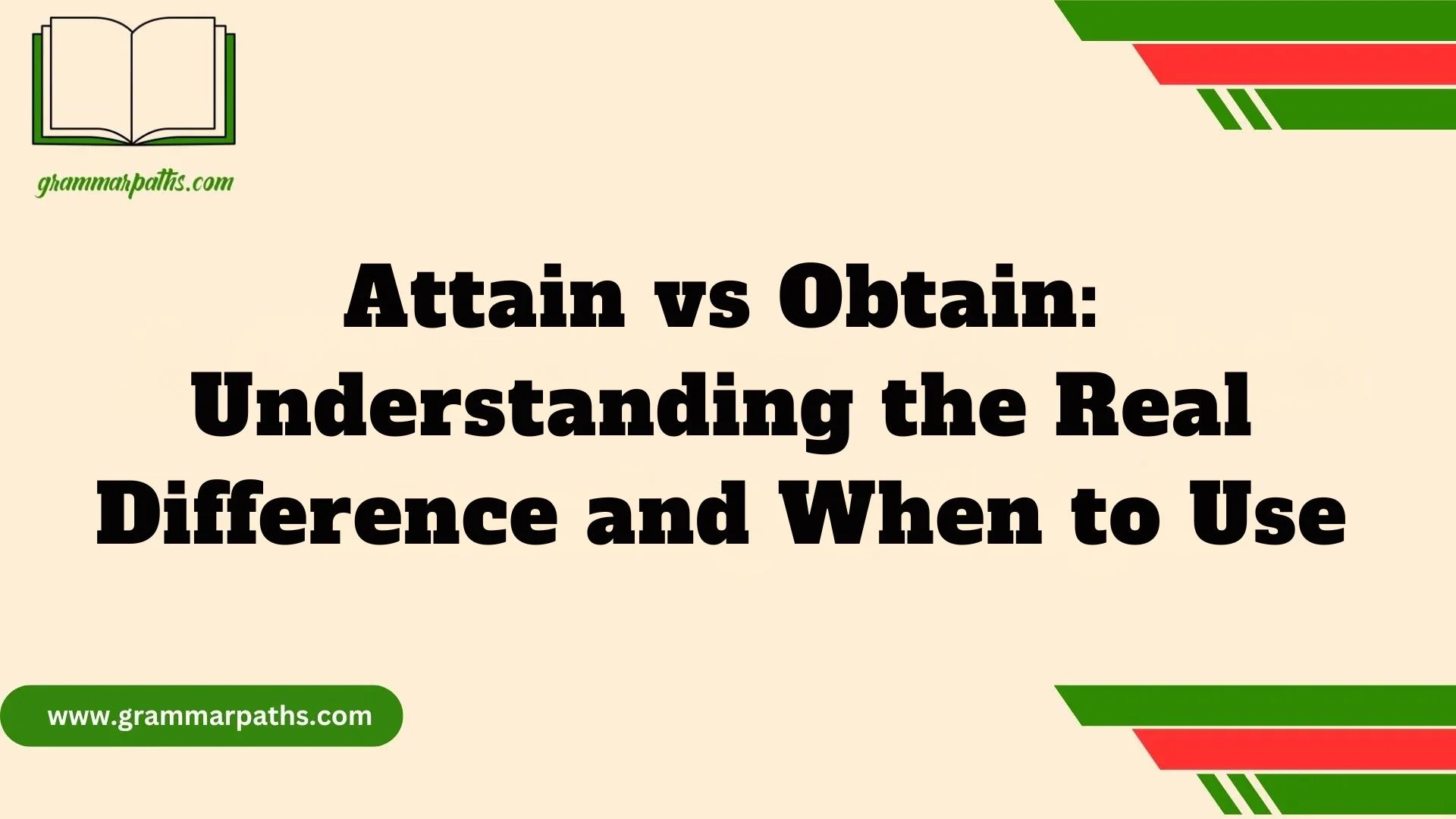Have you ever found yourself stuck between choosing the words attain and obtain? You’re not alone. These two verbs are often used interchangeably, but they actually carry different meanings, especially when it comes to tone, formality, and what you’re trying to express. Whether you’re writing an academic essay or simply trying to sound more polished in everyday conversation, knowing how to use attain and obtain correctly can make your English clearer and more impactful.
The core difference between attain and obtain lies in what you’re going after. We usually obtain tangible things—like information, documents, or permission—things you can physically get or request. On the other hand, you typically attain intangible goals, like success, personal growth, or results. For example, someone might obtain a passport but attain a lifelong dream. This subtle distinction shows how these two words fit differently in tone and context.
Understanding the usage of attain versus obtain in context not only helps ESL learners, but it also sharpens communication for native speakers. From formal writing to casual speech, picking the right verb adds clarity and precision. In this article, we’ll break down their definitions, explore attain vs obtain examples, and give you a simple guide to mastering their use—so you can achieve confidence and get your message across effectively.
Why Do People Confuse Attain and Obtain?
At first glance, attain and obtain seem interchangeable. Both involve getting something. But what kind of “getting”? That’s where the distinction lies.
- Attain suggests reaching or achieving something after effort or progress.
- Obtain focuses on acquiring or coming into possession of something, often more tangible.
People mix them up because their definitions overlap in casual speech. But in professional or formal writing, mixing them up can weaken your message or cause confusion. Knowing the subtle differences sharpens your writing and boosts credibility.
What Do Attain and Obtain Mean? Definitions From Trusted Sources
Let’s begin with solid definitions from major dictionaries:
| Word | Definition | Source |
| Attain | To succeed in achieving something after a lot of effort or progress; to reach a goal or status | Oxford Dictionary |
| Obtain | To get or acquire something, especially by effort, skill, or asking; to come into possession of | Merriam-Webster |
Notice how attain focuses on achievement or success after effort, often involving abstract goals. Obtain leans more towards the act of getting or receiving something, often physical or concrete.
Etymology offers more clarity:
- Attain comes from Latin attingere, meaning “to touch, reach.”
- Obtain derives from Latin obtinere, meaning “to hold, acquire.”
Both relate to reaching or possessing, but their use evolved differently.
The Core Difference: Effortful Achievement vs Acquiring Possession
The simplest way to think about it:
- Attain = Effort + Achievement (goals, status, levels)
- Obtain = Acquire or Receive (things, objects, information)
For example, you attain a diploma after years of study, but you obtain your diploma certificate when the school hands it to you. The first implies struggle or growth, the second implies possession.
Quick Comparison: Attain vs Obtain
| Feature | Attain | Obtain |
| Effort Required | Almost always (implying progress/effort) | Not necessarily (may require effort or just receiving) |
| Abstract or Concrete | Mostly abstract (goals, status, levels) | Usually concrete (objects, information) |
| Common Contexts | Achievements, milestones, personal growth | Physical objects, permissions, information |
| Example Sentence | She attained fluency in French after months of practice. | He obtained a visa before traveling abroad. |
When to Use Attain: Contexts of Achievement and Progress
Attain fits perfectly when discussing:
- Academic and professional achievements: degrees, certifications, promotions
- Personal milestones: mastering a skill, reaching fitness goals
- Levels or statuses: attaining a rank, position, or qualification
- Abstract concepts: enlightenment, peace, happiness
Examples in sentences:
- After years of training, he attained the rank of black belt.
- She attained a level of expertise few could match.
- The company attained record sales last quarter.
This verb emphasizes the journey and effort behind the success.
When to Use Obtain: Acquiring Tangible Things or Information
Use obtain when talking about:
- Getting physical objects: passports, documents, licenses
- Accessing information: data, records, passwords
- Legal or formal permissions: permits, contracts
- General acquiring or receiving (sometimes without much effort)
Examples:
- You must obtain a permit before starting construction.
- He obtained the confidential files from the archive.
- She obtained rare artifacts for the museum.
Here, the focus is on possession or access, not the struggle to get it.
Real-World Usage: Data From Language Corpora
Analyzing large databases of English texts (like the Corpus of Contemporary American English) reveals:
- Attain appears most frequently in academic, business, and motivational contexts.
- Obtain is common in legal documents, official instructions, and technical manuals.
For example:
| Context | Attain Usage % | Obtain Usage % |
| Academic writing | 70% | 30% |
| Legal documents | 15% | 85% |
| Business communication | 60% | 40% |
| Informal speech | 30% | 70% |
This data confirms their functional differences and helps decide which fits your writing.
Cases When Attain and Obtain Are Not Interchangeable
Mixing these two can make your meaning unclear or awkward. Consider these phrases:
- Correct: She attained success.
- Incorrect: She obtained success.
Why? Because success implies achievement, not possession.
Similarly:
- Correct: You need to obtain a license.
- Incorrect: You need to attain a license.
A license is something you acquire, not an achievement you reach.
These nuances matter in formal writing, so use the right verb to preserve meaning.
Side-by-Side Examples of Attain vs Obtain
| Attain Examples | Obtain Examples |
| They attained their fundraising goal in record time. | He obtained clearance to enter the restricted area. |
| She attained fluency after immersive study. | The detective obtained crucial evidence. |
| The athlete attained peak performance last season. | You must obtain a ticket before entering. |
| Attaining peace of mind is a lifelong journey. | The company obtained the necessary permits. |
| He attained a PhD after years of research. | She obtained a copy of the contract for review. |
Situations Where Both Could Fit — But One Sounds Better
Sometimes both verbs apply but with a different nuance:
- She obtained enlightenment through meditation. (Focus on acquisition or arrival at a state)
- She attained enlightenment through meditation. (Focus on effort and achievement)
Here, attain usually sounds more natural, emphasizing the process.
In contrast:
- He attained the book from the library. (Sounds odd)
- He obtained the book from the library. (Correct and natural)
So context and tone guide your choice.
Quick Tips for Choosing Between Attain and Obtain
To decide fast, ask:
- Is this about reaching a goal or achievement? → Use attain
- Is this about acquiring or getting something? → Use obtai
Memory aid:
Attain = Achievement
Obtain = Ownership
How Attain and Obtain Appear in Literature, Law, and Media
In literary works, attain often evokes struggle and personal growth:
“We must attain our dreams through perseverance.” — Anonymous
Legal and official documents favor obtain for its precision in possession:
“Applicants must obtain a valid license before commencing work.” — Government regulation
Media headlines use both depending on context:
- “Scientists attain breakthrough in cancer research.”
- “Travelers obtain visas for summer trips.”
Recognizing this helps tailor your writing for the right audience.
Summary: Mastering Attain vs Obtain
- Attain = effortful achievement, mostly abstract goals and milestones.
- Obtain = acquiring or coming into possession, usually concrete items or information.
- Use attain for progress and success.
- Use obtain for possession and access.
Quick recap table:
| Use Case | Verb to Use | Why |
| Reaching a goal | Attain | Focus on effort and success |
| Getting a physical item | Obtain | Focus on possession |
| Abstract achievements | Attain | Focus on milestones |
| Formal permissions | Obtain | Focus on acquisition |
Frequently Asked Questions (FAQs)
What is the difference between the words obtain and attain?
Obtain means to get or acquire something, usually tangible or through effort. Attain means to reach or achieve a goal, often something abstract like success or a level of knowledge.
Do you obtain or attain knowledge?
You typically attain knowledge because it’s an abstract concept that is achieved through learning and effort, not something physically acquired.
What is the meaning of the word attain as it is used in the text?
Attain means to reach a goal or level, especially through effort or progression—often used for achievements like success, skills, or personal growth.
What is the difference between attainable and obtainable?
Attainable refers to goals or achievements that can be reached, while obtainable refers to objects or resources that can be acquired or gotten.
Is attain a synonym for obtain?
They can be near-synonyms in some cases, but not always. Attain emphasizes achieving goals, while obtain emphasizes getting something, often physically.
Conclusion:
Understanding the difference between “attain” and “obtain” is essential for anyone looking to improve their English vocabulary, especially when striving for clarity and accuracy in communication. While both words imply acquiring something, they are used in different contexts. You attain things like goals, success, or skills—those abstract achievements that come from effort and perseverance. On the other hand, you obtain physical or tangible things, such as documents, data, or permission—things you can possess, request, or be given.
By learning how to use attain vs obtain correctly, you’ll become more confident in your academic writing, professional communication, and everyday speech. Always remember: if it’s a goal, you attain it; if it’s an object or right, you obtain it. This subtle but powerful distinction will help you avoid common mistakes and elevate your English usage—just as you’ve now attained a better understanding of these words.

Mia Rose is the passionate writer and founder of GrammarPaths.com, a resource dedicated to helping learners master English grammar, idioms, and writing skills with ease. With a deep love for language and years of experience in teaching and content creation, Mia simplifies complex grammar rules into clear, practical guides that readers can instantly apply.












